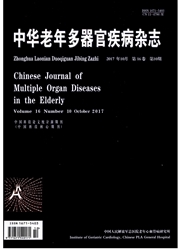

 中文摘要:
中文摘要:
目的:探讨编码CYP2C19酶的基因(CYP2C19)功能缺失性(LOF)等位基因与老年冠心病患者支架植入术后氯吡格雷抗血小板反应性和临床心血管终点事件的关联性。方法连续募集2011年9月1日至2012年12月1日期间在解放军总医院住院拟行经皮冠状动脉介入术(PCI)、年龄≥65岁的老年冠心病患者,术前给予氯吡格雷负荷剂量(300mg)治疗,手术当日测定血小板聚集率,采用SNaPshot法进行CYP2C19 LOF等位基因型(CYP2C19*2和CYP2C19*3)检测,并记录在院临床资料。所有患者均在PCI术后1年规律服用阿司匹林和氯吡格雷,随访1年内主要心血管缺血和出血事件的发生率。结果在436例符合入选标准的老年冠心病患者中,CYP2C19*2携带者与氯吡格雷负荷剂量治疗后的抗血小板反应性之间存在显著相关性(P=0.001),但在CYP2C19*3携带者中未见上述相关性(P=0.884)。CYP2C19*2和至少一个CYP2C19 LOF携带者1年内心血管终点事件的发生率较非携带者均明显增加(P<0.05)。与非携带者相比,CYP2C19*2携带者因心绞痛再入院的发生率明显增加[校正比值比(OR):1.67,95%可信区间(CI):1.05~2.65,P=0.010]。至少一个CYP2C19 LOF携带者的联合心血管事件(校正OR:1.22,95%CI:1.03~1.98,P=0.049)和因心绞痛再入院(校正OR:1.67,95%CI:1.04~2.68,P=0.032)的发生率较非携带者明显增加。结论 CYP2C19 LOF等位基因与老年冠心病患者PCI术后的氯吡格雷抗血小板反应性密切相关,并可明显削弱PCI术后双联抗血小板的治疗效果,导致PCI术后1年内的心血管终点事件发生风险明显增加。
 英文摘要:
英文摘要:
ObjectiveTo investigate the relationships between the cytochrome 2C19 gene (CYP2C19) loss-of-function(LOF) allele with clopidogrel platelet reactivity and cardiovascular end point events intheelderly patients with coronary heart disease (CHD) after percutaneous coronary intervention(PCI).MethodsOver-65-year-old consecutiveCHD patients who accepted selective PCIin our department from September 1,2011 to December 1, 2012 were recruited in this study.They were given clopidogrel loadingdose therapy before PCI,andtheir peripheral blood samples were collected on the day of PCI to detect platelet aggregation. The candidategenetic variants, CYP2C19*2and*3LOFalleles,were determined by using SNaPshotassay, and the results were recordedinthe clinical data. All patients receivedmaintenance dose of aspirin andclopidogrelduring 1 year’s follow-up after PCI, andthemajor adverse cardiovascular events were observedin this period.ResultsAtotalof436 elderly CHD patients were recruited. Significant difference of platelet reactivity was found betweenCYP2C19*2 carriers and non-carriers (P=0.001), but not forCYP2C19*3 (P=0.884). The patients carrying CYP2C19*2 allele or at least one CYP2C19 LOF allele had significantly higher incidence ofcardiovascular end point events than those non-carriers (P〈0.05). Compared with non-carriers, the risk of rehospitalization for angina was significantly higher in the CYP2C19*2 allele carriers[adjustedodds ratio (OR): 1.67, 95%confidence interval (CI): 1.05-2.65,P=0.010]. What’s more, the risk of combined cardiovascular events (adjusted OR: 1.22, 95% CI: 1.03-1.98,P=0.049) and the incidence of rehospitalization for angina (adjusted OR: 1.67, 95% CI: 1.04-2.68,P=0.032)were significantlyhigherin the CYP2C19 LOF allele carriers thanin non-carriers.Conclusion CYP2C19LOF allelesare closely relatedtotheplatelet reactivity of clopidorgrel inthe elderly CHD patients after PCI. Thegenetic variants significantly weakens the effect of antip
 同期刊论文项目
同期刊论文项目
 同项目期刊论文
同项目期刊论文
 Influence of CYP2C9 and VKORC1 genotypes on the risk of hemorrhagic complications in warfarin-treate
Influence of CYP2C9 and VKORC1 genotypes on the risk of hemorrhagic complications in warfarin-treate Clinical benefits of pharmacogenetic algorithm-based warfarin dosing: meta-analysis of randomized co
Clinical benefits of pharmacogenetic algorithm-based warfarin dosing: meta-analysis of randomized co Joint effects of CYP2C19*2 and smoking status on clopidogrel responsiveness in patients with acute c
Joint effects of CYP2C19*2 and smoking status on clopidogrel responsiveness in patients with acute c PON1 Q192R genotype influences clopidogrel responsiveness by relative platelet inhibition instead of
PON1 Q192R genotype influences clopidogrel responsiveness by relative platelet inhibition instead of Limited contribution of mitochondrial tRNA variants to the risk of essential hypertension in Chinese
Limited contribution of mitochondrial tRNA variants to the risk of essential hypertension in Chinese Genetic determinants of high on-treatment platelet reactivity in clopidogrel treated Chinese patient
Genetic determinants of high on-treatment platelet reactivity in clopidogrel treated Chinese patient 期刊信息
期刊信息
